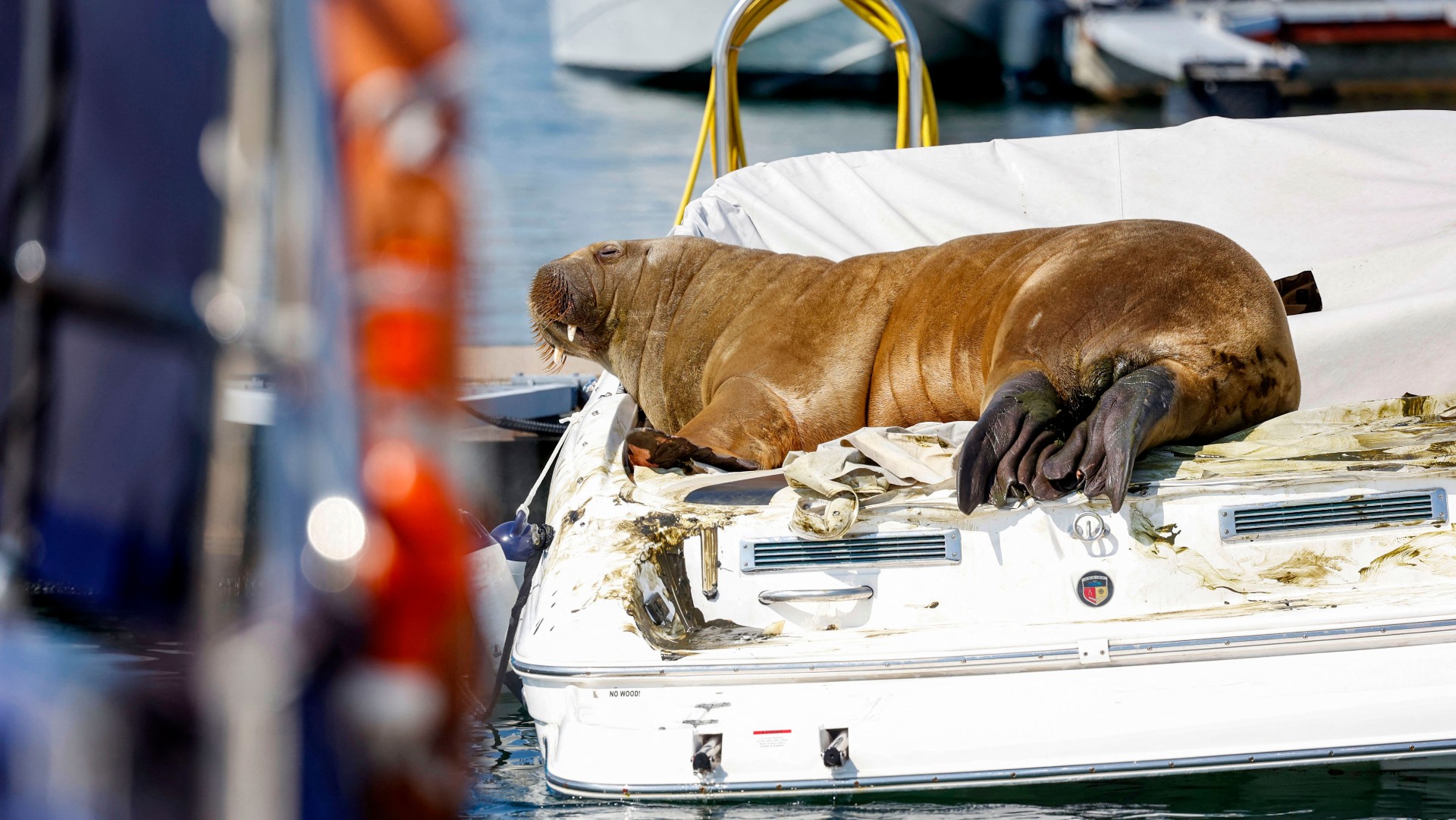Why Norway euthanised ‘beloved’ walrus Freya
The 600kg animal had become a popular attraction in the Oslo Fjord

A free daily email with the biggest news stories of the day – and the best features from TheWeek.com
You are now subscribed
Your newsletter sign-up was successful
The decision by Norwegian authorities to euthanise a “celebrity” walrus has triggered an outpouring of grief and anger.
Named after the Norse goddess of beauty and love, Freya the walrus had been sighted off the UK, the Netherlands, Denmark and Sweden before making headlines after “she chose to spend part of the summer in Norway”, reported The Guardian.
CNN said the “beloved” 600kg walrus “became a social media sensation” after being filmed “clambering onto small boats to sunbathe”. Huge crowds came to see her lounging about in the Oslo Fjord, an inlet on Norway’s southeastern coast.
The Week
Escape your echo chamber. Get the facts behind the news, plus analysis from multiple perspectives.

Sign up for The Week's Free Newsletters
From our morning news briefing to a weekly Good News Newsletter, get the best of The Week delivered directly to your inbox.
From our morning news briefing to a weekly Good News Newsletter, get the best of The Week delivered directly to your inbox.
But following reports of visitors swimming with her and getting dangerously close to take photos, the Norwegian Directorate of Fisheries warned last week that Freya might have to be put down if the risk to human safety was deemed too high.
The public “appeared to ignore the advice” to keep their distance, ITV News reported. According to local media, on one occasion, police blocked off a bathing area after the walrus chased a woman into the water.
The directorate told CNN that multiple solutions were being considered, including relocating Freya out of the fjord. But in a statement on Sunday, the department announced that a “decision to euthanise” had been “taken on the basis of a global evaluation of the persistent threat to human security”.
Although euthanising Freya “might cause reactions with the public”, it “was the right call”, said director general Frank Bakke-Jensen.
A free daily email with the biggest news stories of the day – and the best features from TheWeek.com
Critics were quick to disagree. The decision to kill Freya was “too hasty”, said a Facebook post by Rune Aae, a biologist at the University of South-Eastern Norway who had been tracking Freya’s movement on a Google map to help people know when to stay away from her.
According to The New York Times, “walruses are social animals and rarely venture somewhere alone, which may have been why Freya had spent time in a highly populated area” around the Norwegian capital.
A protected species, walruses normally live further north in the Arctic and “do not usually attack humans”, said the BBC, although “there have been some rare incidents”.
According to the World Wide Fund for Nature, a total of around 230,000 walruses live in the wild, predominantly in ice-covered waters in Canada, Greenland, Norway, Russia and Alaska.
The walrus was “once threatened by commercial hunting, but today the biggest danger it faces is climate change”, with widespread loss of glaciers and sea ice, said the conservation organisation.
-
 Political cartoons for February 19
Political cartoons for February 19Cartoons Thursday’s political cartoons include a suspicious package, a piece of the cake, and more
-
 The Gallivant: style and charm steps from Camber Sands
The Gallivant: style and charm steps from Camber SandsThe Week Recommends Nestled behind the dunes, this luxury hotel is a great place to hunker down and get cosy
-
 The President’s Cake: ‘sweet tragedy’ about a little girl on a baking mission in Iraq
The President’s Cake: ‘sweet tragedy’ about a little girl on a baking mission in IraqThe Week Recommends Charming debut from Hasan Hadi is filled with ‘vivid characters’
-
 The plan to wall off the ‘Doomsday’ glacier
The plan to wall off the ‘Doomsday’ glacierUnder the Radar Massive barrier could ‘slow the rate of ice loss’ from Thwaites Glacier, whose total collapse would have devastating consequences
-
 Can the UK take any more rain?
Can the UK take any more rain?Today’s Big Question An Atlantic jet stream is ‘stuck’ over British skies, leading to ‘biblical’ downpours and more than 40 consecutive days of rain in some areas
-
 As temperatures rise, US incomes fall
As temperatures rise, US incomes fallUnder the radar Elevated temperatures are capable of affecting the entire economy
-
 The world is entering an ‘era of water bankruptcy’
The world is entering an ‘era of water bankruptcy’The explainer Water might soon be more valuable than gold
-
 Climate change could lead to a reptile ‘sexpocalypse’
Climate change could lead to a reptile ‘sexpocalypse’Under the radar The gender gap has hit the animal kingdom
-
 The former largest iceberg is turning blue. It’s a bad sign.
The former largest iceberg is turning blue. It’s a bad sign.Under the radar It is quickly melting away
-
 How drones detected a deadly threat to Arctic whales
How drones detected a deadly threat to Arctic whalesUnder the radar Monitoring the sea in the air
-
 ‘Jumping genes’: how polar bears are rewiring their DNA to survive the warming Arctic
‘Jumping genes’: how polar bears are rewiring their DNA to survive the warming ArcticUnder the radar The species is adapting to warmer temperatures